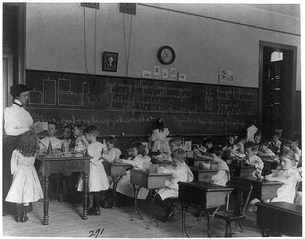
Take for example the argument frequently raised that public schools are failing our students and that "private" institutions can do a better job. By asserting this position, States must "help" finance private education by shifting public dollars in the form of vouchers to "fund those less fortunate" (to allegedly obtain a better education than available in public schools). As part of this line of reasoning, we are consistently directed to the "cost to educate" each student and how that investment is not paying off for taxpayers. We are often told that "schools need to run more efficiently, like a business in order to guarantee success." Sounds great, but so does a lot of rhetoric...until you pull the curtain back and realize the rhetoric is just that, talking points created to benefit special interest groups intent on diverting public monies into their "for profit" hands.
Whenever you see the financial argument that a State pays a certain amount for each student's education, you always see a follow-up argument that "spending more money is not the answer." Instead, the answer is always to spend it elsewhere (where the implication is it will be better spent). But this argument lacks merit. Just take a look at any school today. How much of the total amount of money allocated per student actually gets to the average student for their education? What you will find instead, are significant sums of that cash going towards educating children with special needs in the form of smaller class sizes, personal aides and specific individualized therapies.
Please do not misread me here. I am in favor of educating special needs children. I am though opposed, to those using rhetoric intended to mislead the public when it comes to per pupil spending. The average student does not receive the amount of money the State claims is allocated per child. The "averages" include higher amounts allocated for special needs education. If so much more is spent on special education, less is spent on "average" students.
Which leads to another point. Most Americans are unaware that when told "private" or "Charter" schools are more efficient with their student expenditures, these very same schools often times provide no special education services. As a result, the public schools are left to provide those services, leaving the "private" entities free to spend its per student allocation any way they see fit (and to freely allocate funds not towards actual education of students, but towards their For-Profit bottom lines). In some States, public schools are required to test their students across the board and are evaluated based upon student performance, while private or "charter" schools may not be required to meet the same State standards. Apples to oranges anyone?
And finally, claiming schools need to run more efficiently like a business is as disingenuous as it can get. Unlike a business that can pick and chose its suppliers, public schools must deal with a clientele that varies across many emotional, financial, motivational and cognitive ability lines. Unlike a business that can target an audience, schools must accept all students, regardless of how difficult their home lives are, regardless whether students have a meal in their stomachs when they come to school (or for lunch, or even after school). Schools also have to deal with many students who struggle on a daily basis without having any support systems at home. Can anyone tell me how educators are supposed to make up for these types of deficits that affect student learning? Businesses can simply shift to other markets and terminate relationships with providers of substandard materials and ingredients. Schools accept everyone, yet advocates of the voucherization of public education funds seem to think everyone comes to school equipped with the same tools - when in reality, they do not.
So next time you hear rhetoric about public schools doing such a poor job of educating students and that throwing money at the problem will not solve it, please remember that there is a lot going on outside of the classroom that affects student outcomes, and even more diversity of needs being addressed in the classroom that affect student outcomes and performance. And please know that current education policy when it comes to curriculum and testing, are determined by the State legislature, and not by educators. Can we do more to help public education succeed? You bet, but diverting public funds to private for-profit entities is certainly not the answer! As President James Madison once wrote; "Learned institutions ought to be favorite objects with every free people. They throw that light over the public mind which is the best security against crafty and dangerous encroachments on the public liberty." A public liberty, not a private one! Have a great week!
 RSS Feed
RSS Feed
